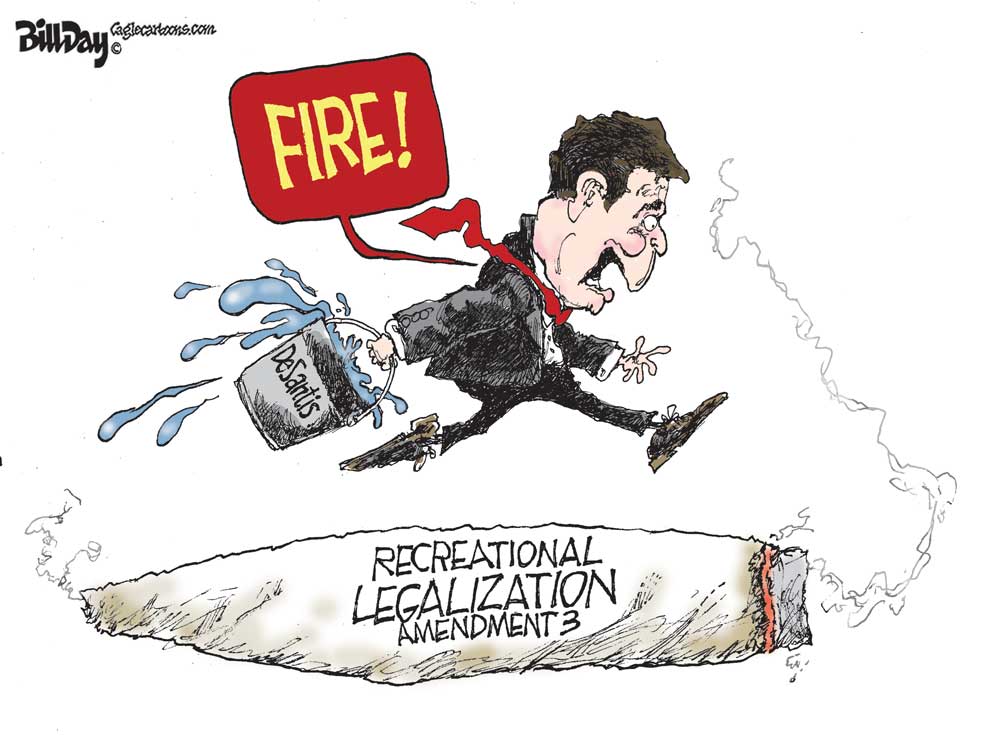
To include your event in the Briefing and Live Calendar, please fill out this form.
Weather: Partly cloudy. A chance of showers and thunderstorms. Highs around 90. Lows in the lower 70s. Chance of rain 50 percent.
- Daily weather briefing from the National Weather Service in Jacksonville here.
- Drought conditions here. (What is the Keetch-Byram drought index?).
- Check today’s tides in Daytona Beach (a few minutes off from Flagler Beach) here.
- tropical cyclone activity here, and even more details here.
Today at a Glance:
In Court: Today is Circuit Judge Terence Perkin’s last day on the bench before his retirement.
Nar-Anon Family Groups offers hope and help for families and friends of addicts through a 12-step program, 6 p.m. at St. Mark by the Sea Lutheran Church, 303 Palm Coast Pkwy NE, Palm Coast, Fellowship Hall Entrance. See the website, www.nar-anon.org, or call (800) 477-6291. Find virtual meetings here.
Notably: The February 14, 1974 edition of The New York Times, page 7, carried the following article by Raymond Anderson, datelined Beirut: “Worried over possible reprisals by Israeli, Lebanese officials are raising anxious demands that an end be put, “once and for all,” to Palestinian commando shooting and raiding across the southern border into Israel. Voices have been raised in Parliament for a “disengagement” of Palestinians from the border zone and formal nullification of a 1969 accord that granted Palestinian commandos a base area on the slopes of the strategically situated Mount Hermon. In recent days, two Israelis have been killed in commando action near the Lebanese border and another was wounded. Yesterday, an Israeli town, Metulla, came under rocket and small‐arms fire from across Lebanon’s border. Israeli artillery fired into Lebanon in retaliation. The Lebanese fear a destructive Israeli incursion, in a pattern established over recent years, if the commando attacks are not halted.” February 1974: fifty years ago. Nothing has changed. Instead of the PLO, it’s Hezbollah. Same Israel. Same madness on both sides. In 1974, Lebanon was contending with one of its worst self-inflicted wounds in its still short history: that 1969 “accord” it signed in Cairo, enabling the PLO to have an armed presence in Lebanon. The Lebanese government soon realized its grave error. It had handed the Palestinians the guns with which to demolish Lebanon. They (the Palestinians) had nothing to lose, using Lebanon as a launching pad against Israel. It wasn’t their country that would get clobbered in retaliation. Finally the 1982 Israeli invasion, for all its murderous devastation (18,000 killed, mostly Lebanese, mostly civilians) got rid of the PLO. In came Hezbollah, born that very year out of the ashes, with this difference: Hezbollah is a Lebanese militia, made up of Lebanon’s southern Shiites, who have always been ignored by Beirut’s Maronite Christians and Sunni Muslims. Hezbollah claims it’s “resisting” Israel. But it’s not resisting shit when it it fires its missiles at Israel in solidarity with Gaza’s Palestinians. Gaza’s Palestinians are of course owed solidarity. But not at the expense of Lebanon. Hezbollah has reinvited Israeli devastation, not because it cares about Hamas or the Palestinians, but because it is Iran’s client. Read that line again from the Times article: “The Lebanese fear a destructive Israeli incursion, in a pattern established over recent years, if the commando attacks are not halted.” You could write it today, as Israel is poised to re-invade for the fifth time since 1978, if it hasn’t already. Robert Fisk summed it up well in 1990: “the abduction of Lebanon.) See the quote below.
—P.T.
Now this: Israel’s 1978 invasion:
View this profile on Instagram
![]()
The Live Calendar is a compendium of local and regional political, civic and cultural events. You can input your own calendar events directly onto the site as you wish them to appear (pending approval of course). To include your event in the Live Calendar, please fill out this form.
January 2026
ESL Bible Studies for Intermediate and Advanced Students
Grace Community Food Pantry on Education Way
Palm Coast Farmers’ Market at European Village
“Turtle Trail Artists of Flagler County,” at Expressions Art Gallery
Al-Anon Family Groups
‘Lady Day at Emerson’s Bar and Grill,’ the Billie Holiday Story, at City Rep Theatre
Flagler County Library Board of Trustees
Flagler County Commission Evening Meeting
Nar-Anon Family Group
Bunnell City Commission Meeting
For the full calendar, go here.

The Lebanese were powerless to control this conflict between Israel – a foreign nation with which Lebanon was still technically at war – and an increasingly strong Palestinian army of guerrillas who now controlled their own camps in Beirut and elsewhere in Lebanon. Palestinian gunmen stood guard at the entrances of the camps of Sabra, Chatila, Karantina, Tel al-Za’atar and Bourj al-Barajneh in the capital. The Israelis alleged that the Palestinians had created a state within a state, a claim with which few Lebanese would have disagreed. Whenever the Palestinians attacked Israeli targets abroad, the Israelis invariably assaulted Lebanon. After guerrillas attacked an El Al jet at Athens airport, Israeli troops landed beside Beirut airport and destroyed 13 aircraft belonging to Middle East Airlines (MEA), the country’s national carrier, and other Lebanese companies. There were Israeli attacks inside Beirut itself. Three leading PLO figures and the wife of one of them were murdered in their homes in rue Verdun by an Israeli assassination squad on 10 April 1973. In 1974, the Israelis began staging what they called pre-emptive’ raids, attacks made against Palestinian targets without provocation.
–From Robert Fisk’s Pity the Nation: The Abduction of Lebanon (1990).






































Pogo says
@Elsewhere
US Nazis, homophobes, religious fanatics, and clinically stupid — receive lifeline
https://www.google.com/search?q=us+uncommitted+movement+2024
Ray W says
This from The Nation:
“Ohio is considered one of the ‘most gerrymandered states’ in the country, along with Texas, Louisiana, and Arkansas. Research from the Brennan Center found that 9 million Ohioans — around 77 percent of the state’s population — live in districts where the election for state representative lacks electoral competition. Of those, half featured no primary contest. Redistricting maps drawn by the Ohio Redistricting Commission have been declared unconstitutional — and rejected — by the state Supreme Court on several occasion.”
Make of this what you will. Me? If accurate, the article has 38% of Ohio’s residents living in districts where there is ZERO choice for state houses of Congress offered by either party from primary through to final elections, due to gerrymandering.
On the 2024 Ohio ballot in November is “Issue 1.”
“Issue 1 would create a 15-member Citizens Redistricting Commission — made up of Democrats, Republicans, and independents — to draw district maps. Current and former politicians, political party officials, and lobbyists would be banned from sitting on the commission, and attempts to draw districts in a way that favor one political party or lawmaker would be made unconstitutional.”
If eligible, citizens can apply for a seat on the Commission. “A screening panel of two Republican and two Democratic retired judges – each chosen by the legislative members of the Ohio Ballot Board – would review and select applicants.”
“The Ohio GOP, which controls the statehouse, the state Supreme Court, and the governor’s office, opposes the amendment. In March, the press secretary of the Ohio Senate Majority Congress called it an ‘exceedingly complex, harebrained, and radical scheme’ that would ‘install a citizen’s commission to replace your elected representative.'”
For those John Birch-inspired elements of the FlaglerLive community, a statewide referendum on Issue 1 put to the people of Ohio proves that America is more than just a republic; it is a liberal democratic Constitutional republic.
To the rest of the FlaglerLive community, that a press secretary for the Ohio Senate Majority Congress would use the term “radical” to describe an effort to create districts that do not favor one party over the other proves that there is a capacity to think backwards among “pestilential” partisan members of faction.
In 1980, one of my professors asked the class to find which word had the greatest number of different meanings. The verb “to run” at that time had 105 different meanings. I looked it up a few years ago; it now has well over 400 different meanings. The English language can be rich in nuance. But one of the many meanings meant “to stop.” To argue that something that is designed to be bipartisan is “radical” is an example of backwards thinking. Radical can mean many different things, but it can never mean “to be fair and impartial.”
Several FlaglerLive commenters like to attach the ideologically powerful term “radical” to a form of political thought that has long been mainstream. We all are bombarded by attack ads claiming that one politician or another is “radical”.
These efforts to misinform and disinform and distort are nothing more than attempts by those lacking in intellectual integrity to persuade the gullible among us to vote against certain party opponents. Me? I oppose those who threaten and sometimes promise violence and murder if elected. And I oppose those who seek to misinform and disinform and distort.
It very well might be that Mr. Tristam is more correct than wrong when he argues that America has been dragged so far to the right since the Reagan years that there is no longer any legitimacy to the argument that there is even a viable American political “left” anymore. That there is now only a radical right and a center right in American politics, with but a few stragglers wandering in the wilderness of the dying left.
This idea of a dying left raises the idea of the also possible dying conservative movement in America. If conservatism meant from its founding the adherence to separation of powers, the rule of law, and the establishment and furtherance of individual rights (there is a 300-year history that this was once so), then I have a valid right to argue that I am more conservative today than most of what little is left of the once-proud Republican Party that now champions rule by “the one” to the detriment of separation of powers (monarchy?), a lessening of individual rights, and the slow dissolution of the rule of law, e.g., “I alone can fix it.”
Oy, vey!
Ray W says
This is a thought exercise.
As foundation for the exercise, I have repeatedly commented that technological improvements and innovations have steadily brought down the expenses of extracting oil from shale rock formations over the last 15 years or so from just under $60 per barrel to around $25 per barrel.
Improvements in 3D seismic imaging allow horizontal drill operators to more accurately direct bores into more lucrative formations of shale oil.
Improvements in horizontal drilling techniques allow for longer and longer horizontal bores, thereby increasing the “pay zone”, yielding more oil per bore.
Breakthroughs in fracking fluid compounds allow for the release of more oil than before from the shale rock formations.
These three breakthroughs in technology mean that fewer and fewer drilling rigs can release more and more oil per well.
So, if today’s shale oil companies spend $25 per barrel on average over the life of a bore to locate and then extract oil, and if today’s West Texas Intermediate sells for roughly $68 per barrel, then there is about $45 dollars in revenue over costs per barrel for American shale oil producers to pay all other business expenses. Some of the remainder goes to profit for shareholders and to taxes, and to cover any other externality that might arise.
I have long argued that American oil companies wanted OPEC+ to cut production figures; they wanted $80 per barrel oil prices on the international marketplace, or more.
And American shale oil producers have had oil prices of $80 per barrel ever since OPEC+ voluntarily cut their production figures by 7 million barrels per day in February 2021, until recently. At the time of the announcement of OPEC+ production cuts, crude oil was at or near $35 per barrel on the international crude oil marketplace, due to low demand in the pandemic-affected economy, i.e., people were simply driving less as America and the rest of the world emerged from shut-downs. American gasoline was selling at the pump for about $2 per barrel.
So which scenario do American shale oil producers prefer? The $35 per barrel oil or the $80 per barrel oil? In a capitalist economy, the answer is simple.
What incentive would an American shale oil producer have to drill for more oil if drilling for more oil drove the price back down to $35 per barrel so we could enjoy $2.00 per gallon gasoline prices again?
With Chinese energy demand down for many months, and with Canada, Guyana, Brazil and the U.S. slowly expanding their oil production, international crude oil prices are dropping. Again, it has been years since West Texas Intermediate has been selling as low as $68 per barrel, but this is where we all are today. Gasoline prices are dropping, due to a small glut in supply and little increase in demand, but it is still above $3 per gallon on average in the area.
So now we come to the reason for my foundational argument.
Last month, former President Trump announced “[p]rices will come down and come down dramatically and come down fast.”
According to the LA Times, when asked by a Sinclair Broadcast Group reporter just how he would make prices drop, Trump said:
“They come down with energy and they come down with interest rates. … We’re going to get energy [prices] down by 50% in 12 months. We’re gonna have it. It’s going to be a major smash on energy.”
The LA Times wrote:
“That’s not a plan, it’s a pipe dream. A president has no power to make energy prices drop by 50%. Trump has promised to deregulate the oil and gas industry and open more federal land to drilling, that’s probably what he means by ‘major smash.’ But economists say it’s unrealistic to expect these steps to produce major price drops in a global energy economy.”
Make of this what you will. Me? Does anyone think that American energy producers will drill for so much more oil that their average revenue above expenses will drop from $45 per barrel to $10 per barrel? I don’t think they will, but I am a enlightened capitalist at heart. I am not a “pestilential” partisan member of faction. Adherence to intellectual rigor, based on cautious application of the three forms of reason drives my comments.
Like JimboXYZ and Dennis C. Rathsam, I long for $2 per gallon prices. But I know that it was a blip in time; it happened only because of the pandemic. It will not happen again simply because of a candidate’s promise.
FlaglerLive readers? Your thoughts, please?
BillC says
You left environmental costs out of your analysis of the price of oil, so it is inaccurate. Groundwater and air pollution, climate change, sea level rise, insurance increases, power outages, etc. These costs do not appear on the fracker’s balance sheet. They are gift wrapped and handed to world to bear the true cost.
Ray W says
Hello BillC. Thank you for your comment.
You are right, of course to address the externalities to the economies of oil and gas extraction. If the full cost of consuming carbon fuels were included in the price of the fuel we buy, we would pay much more for each gallon. My scenario addresses the subsidized cost of fuel, which even today still incorporates much of the calculus we set up long ago to meet energy demand. But there remains an effort to regulate the industry so that truce costs are added to the calculus.
For example, the Biden administration just issued rules addressing the issue of flaring of natural gas at the wellhead, and of natural gas leaks in the distribution network. These rules are aimed at making the capture of some of the methane that now escapes into the atmosphere a more financially feasible process. Does anyone think that the energy companies want to be forced into purchasing the equipment necessary to capture escaping natural gas?
A company called EDGE LNG has developed a 40-foot trailer that can be towed to any wellhead; it captures the natural gas onsite and liquifies it for more efficient transport to customers. Many producing wells are not linked into a natural gas pipeline network. Any natural gas that is also produced is usually flared off or simply released into the atmosphere. Now, the natural gas can be captured, liquified and stored until a truck arrives to transport the LNG to a customer. I don’t know the specifics of the costs involved, but if natural gas prices on the international marketplace are high enough, then the operation is feasible. Right now, natural gas prices are low.
Again, thank you for bringing the concept of externalities into the conversation.
BillC says
By the term “externalities” you really mean “irrelevancies”. Your argument sounds like that of an oil industry lobbyist, similar to big tobacco falsely claiming smoking didn’t cause cancer, or Purdue Pharma saying they weren’t responsible for opioid addiction resulting from taking Oxycontin. They both knew otherwise. IMO this country is addicted to artificially cheap energy, the true cost of damages being misrepresented to the public by lobbyists and politicians.
Ray W, says
I am going to have to call you out on this one, BillC.
The term “externality” has a specific meaning in economics. You are trying to redefine it to mean something that it doesn’t mean and has never meant. So, no, I don’t mean irrelevancies. You should know better. But it was a good try. Thank you.
Dictionary.com defines irrelevant as:
“not connected with or relevant to something.”
Vocabulary.com defines irrelevant as:
“not related to the subject at hand.”
Investopedia defines externality as:
“a cost or benefit that is caused by one party but financially incurred or received by another. Externalities can be negative or positive. A negative externality is the indirect imposition of a cost by one party onto another. A positive externality, on the other hand, is when one party receives an indirect benefit as a result of actions taken by another.
“Externalities can stem from either the production or consumption of a good or service. The costs or benefits can be both private — to an individual or an organization — or social, meaning it can affect society as a whole.”
There are other definitions for externality out there.
What this means is that an externality must be connected with something, be it significant or not, and an irrelevancy must not be connected to something. An externality can be minor, it can be the most important factor, and yes, if stretched to an extreme, it can be remotely synonymous with an irrelevancy, but no matter what the externality is, it is by definition a connected factor that is ignored when considering an economic decision. Your attempt almost completely changes the meaning of externality.
The real issue is that the leaders of the American gas and oil industry have managed to so influence political actors and government regulators as to create a regulatory structure that does not require the industry to factor in all of the costs of its products, including the many costs of pollution, into its business model. Certain connected costs can simply be ignored with impunity.
I lament and decry this fact, but when many American energy companies make decisions on when and where to drill and, derivatively, how much to produce, they simply don’t consider the environmental costs when making these decisions. Until a new regulatory structure forces them to do so, it will not happen.
We oppose the same thing. I wish for a world that does not rely on extracted carbon-based energy. But 15 years or so ago, the world was extraction under 90 million barrels of oil per day. Now, we are at 102 million barrels per day and steadily climbing.
We are adding renewables at a pace never before seen, yet the demand for crude oil continues to rise.
The American political class threw away some 25 years of potential research and development of renewable sources of energy and ceded the field to Chinese industry, weakening all Americans. We are paying more for electricity today than we should be paying, but our leaders simply do not force the changes needed to get us to a point where renewables can start displacing carbon-based forms of energy instead of supplementing them.
A 2022 Environment & Climate News article depicted “dozens” of combine-cycle natural gas plants under construction in the U.S., with all of them expected to come online before or during 2025. More were in the planning or permitting phase. Businesses hope to get 40 or 50 years of service from such plants before they are decommissioned.
Perhaps Pogo is right that I am too sanguine, but I see one billion humans out of eight billion who are living some form the Western energy-consuming lifestyle. Does anyone think that the other 7 billion humans do not want a climate-controlled home, personal transport, and all other trappings of that life? I think they do, and when they get it, one family at a time, they are going to demand huge amounts of energy. AI places high electricity demands. Even block-chain technology demands much of our energy grid.
As an aside, electric boats, particularly pontoon boats, and in many other cases, trimaran boats, are making inroads in the personal boating industry. Pontoon boats are not designed for speed anyway, and solar panels can be mounted on the broad tops of such boats. Some sizeable pontoon boats can cruise up to 9 hours on a charge, sans solar panels. The panels, according to the literature, add as much as one hour of cruising time for every two hours of direct sunlight.
Ray W says
A little more on the financial benefits and costs of immigration.
A few days ago, the Wall Street Journal ran a story on the issues.
The reporter initially addressed two studies published by different economists. They offered similar conclusions. One of the studies used a methodology based on subtracting “benefits received” over time from “taxes paid” over time. The studied class was immigrants with less than a high-school diploma.
The findings? Each such member of the class would receive on average $109k more in benefits than they would pay in taxes over a lifetime.
Make of this what you will. Me? The methodology is laid out in simple terms and the conclusion seems valid.
The reporter interviewed three more economists. Their position was that the two studies were accurate but deficient in scope. Their argument was that since labor adds value to a business’s capital, a more comprehensive and accurate study would necessarily have to include the contributions of employees to the overall business’s success (for example a roofing company that employs immigrants will profit from their labor and pay taxes on that profit). After all, the profits, dividends, and capital gains of any corporation adds to the GDP of the nation and these three economically recognized concepts are taxed.
These economists had factored in the additional benefits enjoyed by employers to the overall economy in their study of the issue. When one of the original two economists was asked about the more extensive studies by the three economists, he told the Journal that the more comprehensive studies were valid. His evaluation studied what he deemed important and theirs studied additional factors that were also important.
One of the three more comprehensive statistical studies resulted in a finding that the average immigrant who lacks a diploma adds $128k to the public purse over a lifetime, meaning that average contributions per immigrant significantly outweigh average benefits costs per immigrant, i.e., immigration is comparatively good for our economy, even if the immigrant possesses few skills.
And, that study also addressed the existence of the “ripple effects” of a lesser-skilled employee freeing up a more skilled employee to do better, more efficient work. For the same reason that a hospital hires a lesser-skilled employee to clean a room, which allows an orderly to be more efficient, which allows a nurse to be more efficient, which allows a nurse practitioner to be more efficient, which allows a doctor to be more efficient, hiring a day laborer allows a roofer to be more efficient, which allows the owner to take on more work, which makes it feasible to hire a crew chief, which allows the roofer to grow his business, which allows the business to add a second crew, and so on. Each step increases the efficiency of the nation’s economy and contributes to GDP growth.
According to the economist the reporter interviewed, the “ripple effect” adds between $700-1200 per lesser skilled worker per year to the public purse.
The reporter then cited to a recent Congressional Budget Office report that held the recent surge in immigration will be expected to add on balance $897 billion to the Treasury over the next decade. This report held that if better policies and laws were implemented, they would add even more economic gains to the Treasury.
Again, make of this what you will. Me? I argue that a number of FlaglerLive commuters have gullibly confused political rhetoric for economic truth. We needed all along the millions of immigrants who entered the country over the past few years. The economic reality is that the wave of immigrants created even more jobs than they accepted. American workers were not displaced, they were gently shoved into accepting higher paying jobs. The C.B.O. finds that the newly received immigrant workers will add nearly a trillion dollars to the public purse over the next decade. Businesses run more efficiently when they have enough workers. Yes, immigrants consume government benefits. Children need to be taught. Medical care is accepted. But those same immigrants, when using more complex and complete economic algorithms, contribute to the economy more than they consume from it.
As an aside, the FBI just released updated crime statistics.
Yes, last year the FBI’s crime statistics were based on the just over 60% of agencies that had updated their databases to accommodate a new reporting methodology that was adopted by the FBI in 2020. Yes, the large disparity in reporting rates made it difficult to draw statistically reliable assertions from the dearth of data. Some argued that crime was up. Others claimed crime was down. Both camps were likely wrong.
The new FBI report is based on 94% of all police agencies reporting full data. The FBI asserts that the dataset is sufficiently complete to be considered statistically accurate. Crime is down, says the FBI.
Ray W says
Salon reports that during a Sunday rally in Pennsylvania, former President Trump “called to police to be allowed ‘one real tough, nasty’ and ‘violent’ day to eradicate crime. … One rough hour — and I mean real rough — the word will get out and it will end immediately, you know? It will end immediately.”
A campaign official, when asked, said Trump was “clearly just floating it in jest.”
Make of this what you will. Me? Nietzsche admonished us to “distrust all in whom the impulse to harm is powerful.”
Laurel says
Every time Trump craps the flood, his sycophants and supporters quickly run after him and mop it up, which is frequently.
Why?
Crap is crap. What is so golden about Trump’s crap?
Some jester.
Cult.
Ray W says
Great Britain’s last coal-fired electricity plant closed today after 67 years of operation.
The LA Times wrote:
“In 1990 coal provided about 80% of Britain’s electricity. By 2012 it had fallen to 39%, and by 2023 it stood at just 1%, according to figures from the National Grid. More than half of Britain’s electricity now comes from renewable sources such as wind and solar power, and the rest from natural gas and nuclear energy.”
The Times also reported that Britain’s last coal-fired steel blast furnace also closed Monday. India’s Tata Steel owns the Port Talbot, Wales, site. Tata Steel plans to convert the site’s coal-derivative coke-fired furnace to an electric blast furnace which emits less carbon and requires fewer workers.
Make of this what you will. Me? I will always be in favor of cheaper energy that is also less carbon pollutive. Coal-fired electricity generation is simply no longer cost effective, when compared to utility-grade solar and wind power.
Ray W says
According to the Wall Street Journal, Fed Chair Powell, presumably speaking at the annual gathering of the National Association for Business economics this afternoon, said, “[o]verall, the economy is in solid shape; we intend to use our tools to keep it there.”
The reporter added, “this is not a committee that feels like it’s in a hurry to cut rate quickly.”
Powell also, per the reporter, “cited economic projections they released two weeks ago that showed most officials penciled in the equivalent of two more quarter-point cuts this year.”
The reporter repeated a claimed desire that officials still “hope to achieve a so-called soft landing that brings inflation down without a sharp rise in joblessness.” Powell said, “While the task is not complete, we have made a good deal of progress toward that outcome.”
Make of this what you will. Me? Our economic rebound out of the hole in the world’s economy caused by the pandemic continues apace. Many of the best economists among us all repeatedly express increasing expectation of the proverbial “soft landing.” Yes, the unfunded stimulus spending by both administrations, a.k.a, Trudenomics, led to Trudenflation. Yes, the Fed aggressively raised lending rates in its effort to cool an overheating economy. But all seems to be going according to plan.
Ray W says
The FTC has filed a complaint against John B. Hess, CEO of Hess Corporation, alleging secret collusion with OPEC. Mr. Hess, per the complaint, “urged OPEC officials to push publicly and privately for ‘inventory management,’ or reduced pumping and fracking with the goal of driving up prices.”
Mr. Hess said in 2021 during an earnings call that OPEC has done a “masterful job [in] giving the market what it needs but not oversupplying it.”
Mr. Hess joins Scott Sheffield, Pioneer Natural Resources CEO, who also has been accused of colluding with OPEC to raise crude oil prices by managing production, instead of allowing the international crude oil marketplace to set prices.
Make of this what you will. Me? Two accused, with six to go. From past readings, it appears that as many as eight major American shale oil producers may have colluded with OPEC since early 2021 to keep oil prices high. Time will tell on how this turns out.
Ray W says
Reuters reports that the U.S. just purchased 6 million barrels of oil for $411 million. That comes to just under $69 per barrel.
The oil will be delivered to a Strategic Petroleum Reserve (SPR) site in Louisiana at a rate of 1.5 million barrels per month. According to a Markets Insider article, the most that can be added to the SPR is 3 million barrels per month.
A bit of history might be appropriate. After OPEC+ voluntarily cut crude oil production in February 2021, West Texas Intermediate (WTI) crude oil prices slowly and methodically rose, peaking on March 8, 2022, at $123.50 per barrel, shortly after Russia invaded the Ukraine and Western sanctions cut off much of Russian oil from the international marketplace.
On October 19, 2022, President Biden authorized sales from the SPR at a rate of one million barrels of oil per day for 180 days, in an effort to bring down crude oil prices. The next day, WTI was selling for $85.98 per barrel. That means that the sale of one million barrels brought in $85,980,000 dollars that day. By law, that money goes to the Treasury. 180 days later, on April 17, 2023, WTI was selling at $80.86 per barrel. For 180 days, all of the money gained from the cumulative sales bolstered the Treasury coffers.
Since April 2023, whenever WTI oil has been selling at less than $75 per barrel, the Biden administration has been restocking the Reserve, using whatever money Congress authorizes for the purchases. But Congress gives only so much money at a time to restock the Reserve. Right now, the administration has only enough money left to buy 2 million more barrels at a hypothetical $75 per barrel. More if the price is below $75 per barrel.
Make of this what you will. Me? Congress should authorize whatever money is needed to replenish the SPR whenever WTI prices are below $70 per barrel. The oil was sold on the open market back when prices were higher. The SPR should be slowly restocked when prices are low.
There is a twist on the story, though. I didn’t know before now that Congress passed legislation that mandates the sale of SPR oil to fund certain government programs. Two years ago, the Department of Energy persuaded Congress to allow it to cancel the mandatory sale of 140 million barrels of oil that was to be sold from the Reserve through 2027.
Yes, the gullible among us crow that Biden ordered the sale of 180 million barrels of oil when prices were relatively high, supposedly endangering the nation’s reserve levels, yet at the same time Congress had already mandated the sale of an additional 140 million barrels of oil to fund programs that Congress didn’t want to fund out of the general budget. Now, Congress isn’t fully funding the purchase of enough oil to fully replenish the Reserve when prices are relatively low.
Oh, well!